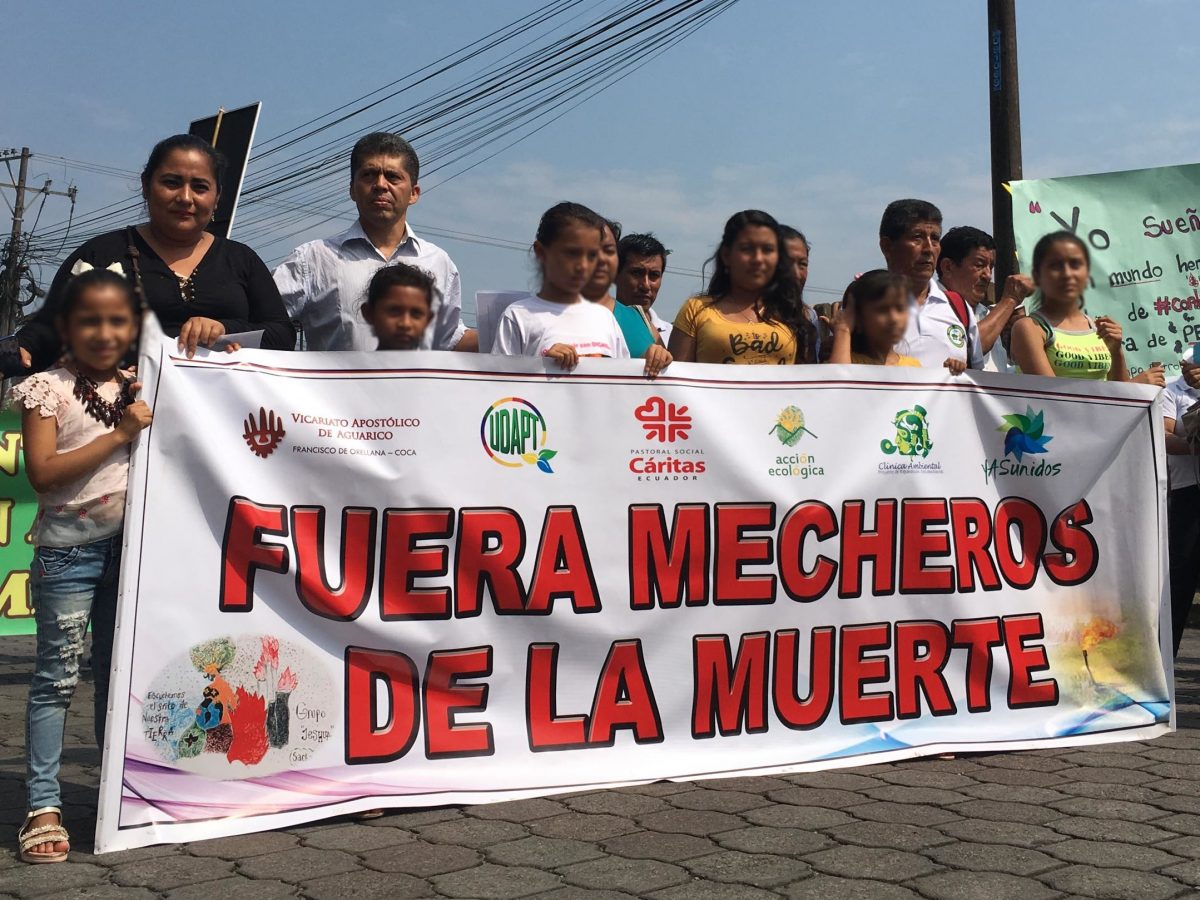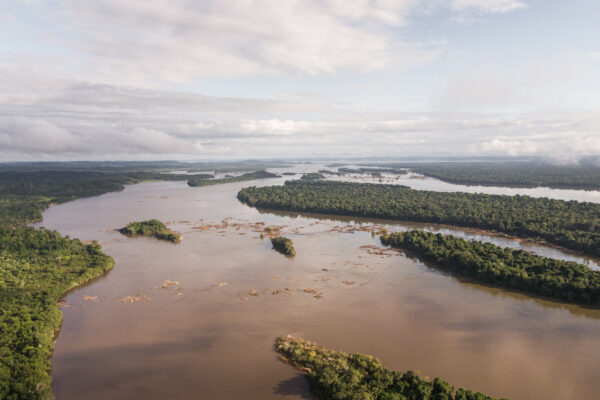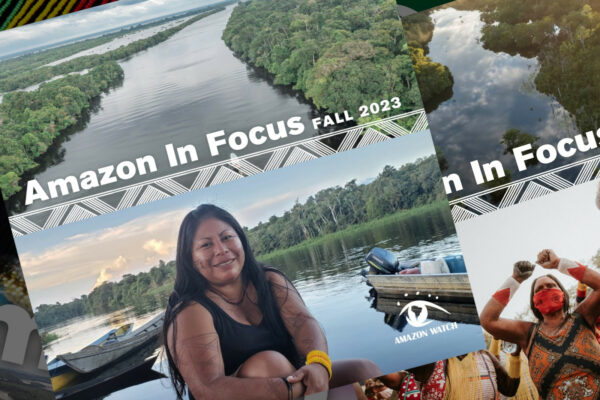In a major victory for the environment, human rights, and our climate, nine Amazonian girls just put an end to the oil industry’s gas flaring in the Ecuadorian Amazon!
The practice has been hiding in plain sight across the Amazon rainforest for decades. For years, Amazon Watch has brought attention to flaring as a source of contamination through its campaigning and on-the-ground advocacy work alongside our long-term Indigenous partners. Amazon Watch’s Ecuador Advocacy Advisor, Sofia Jarrin Hidalgo, and I supported the press work needed to amplify this case. Additionally, through our Amazon Defenders Fund, we provided a solidarity grant to the Union of Persons Affected by Texaco/Chevron (UDAPT), one of the organizations spearheading the case. The grant supported the strategies needed to build a successful case, including communications and legal support.
In this case, without precedent, an Ecuadorian appellate court ruled in favor of nine children who are growing up in the shadow and contamination of hundreds of gas flares in the Ecuadorian Amazon. The flares burn 24/7 and have been a common industry practice, releasing toxic chemicals like benzene, hydrogen sulfide, and other pollutants into the surrounding air and water, and they take a huge toll on the health of nearby communities and the region’s unparalleled biodiversity. The amount of flaring from Ecuador’s oil fields also makes the country one of the western Amazon’s largest emitters of CO2 emissions. According to the judgment, companies have 18 months to begin the phase-out of existing flares and end the practice by 2030.
The lawsuit brought by the “Amazonian Nine” is a historic victory against an industry that has been granted impunity for the last 50 years. The plaintiffs, girls between 9 and 13 years old, have grown up next to these flares and oil wells that poison their families daily. They filed suit in February 2020 against Ecuador’s Ministry of the Environment and Water and Ministry of Health, Ministry of Energy, and Non-renewable Resources over the violations of their right to health, water, and food sovereignty.
Their motivation? To grow up free of contamination, to live in an Amazon where life is protected and has fresh, clean water. In their current community, they are forced to live alongside the oil infrastructure built by Texaco (now Chevron), state-run Petroecuador, and myriad other companies. The river water is too toxic to drink or use for bathing, fishing, or washing clothes. Here, even a “solution” is a problem. Rainwater catchment systems aren’t safe either because of the toxins in the rainwater from flaring. Motivation for the “Amazonian Nine” was born both out of a sense of justice and precautionary action for their own health. Many of them have had to witness firsthand the struggles of their mothers and other family members with cancer, a result of living among oil industry contamination, and hope to avoid the same fate.
A 2017 study from the Environmental Clinic of leading Ecuadorian environmental organization Accion Ecologica found elevated rates of cancer among residents in close proximity to oil infrastructure and gas flares in the two oil-producing provinces of Orellana and Sucumbios in the country’s northern Amazon region.
The appellate court ruled in favor of the youth back in January 2021, but only recently announced the measures the oil industry must take to implement the judgment. It also has several measures such as annual monitoring of ecosystem restoration, evaluation of water resources for the implementation of a potable water supply system, the creation of an oncology clinic if supported by data, apologies to the plaintiffs, and monitoring of the implementation of the judgement by the Ombudsman’s Office.
The order could have been stronger but the industry and state-run Petroecuador argued that eliminating flaring overnight would shut down and bankrupt the industry, and used the three-plus months between the decision and writ to pressure the court. The court recognized that the government violated the right to health of the plaintiffs, however, it did not order remediation or damages from the flaring impact, and kept the door open to future permitting if “technological advances” could be found.
The decision is still a point of no return for the industry and provides relief for hundreds of Amazonian families who live day to day with the noise, smell, and health effects of flaring. This case is important because it confirms the crimes of an industry that has profited at the expense of Ecuadorian Amazon and its people; many lives were taken too soon, aided by government complicity, neglect, and impunity. This ruling recognizes the violations of human rights and the rights of nature – violations that often seem only evident to those who are affected. Those who have seen their rivers run black with crude, who live under the “flames of death” that billow smoke and toxins into the air and those who watch the flares incinerate any insect or living creature that gets too close.
While we celebrate this victory, this is just one step in the struggle to keep it in the ground. Our partners will continue to resist until there is full and complete action, and an end to this industry in their communities “There is an inconsistency with the sentence issued in January that recognizes that the Ecuadorian government violated rights, the right to health, the right to a healthy and ecologically balanced environment, and the right to nature. The logical thing to do was provide adequate measures to redress these rights and restore them fully. We waited three months with the hope of a very sensible sentence, but this does not provide full reparation,” shared Pablo Fajardo, UDAPT attorney in a statement.
This ruling adds to the recent exclusion of trade finance for Ecuadorian crude due to environmental, social, and climate reasons from six top European Banks, and the bombshell report from the International Energy Agency last week which concluded that alignment on a 1.5°C pathway implies the end of investments in new fossil fuel supply and an end to new oil and gas development.
Extracting oil from the Amazon rainforest and all the consequent businesses of this industry, such as gas flaring, is becoming unsustainable for the economy after more than 50 years of being unsustainable for life. The ruling presents an obstacle to the plans of Guillermo Lasso, Ecuador’s newly inaugurated president who hopes to solve the country’s economic crisis by doubling oil production. But Ecuador’s oil dependence has never been sustainable for its economy, and it has never been sustainable for our Amazon. A country’s economy cannot rebound from a path of death and destruction. The Amazon that the government is carving up and calling “oil concessions,” are Territories of Life. The way forward is to listen to the voices of the youth who are fighting for future generations, and for a sustainable world and a balanced relationship with nature. It is our responsibility to continue to stand with these girls and fight alongside them to ensure respect for their rights and dignity.
This is a tribute to the nine Ecuadorian girls who finally extinguished fifty years of gas flaring in the Ecuador Amazon. We stand with you. The world and our planet thank you!














